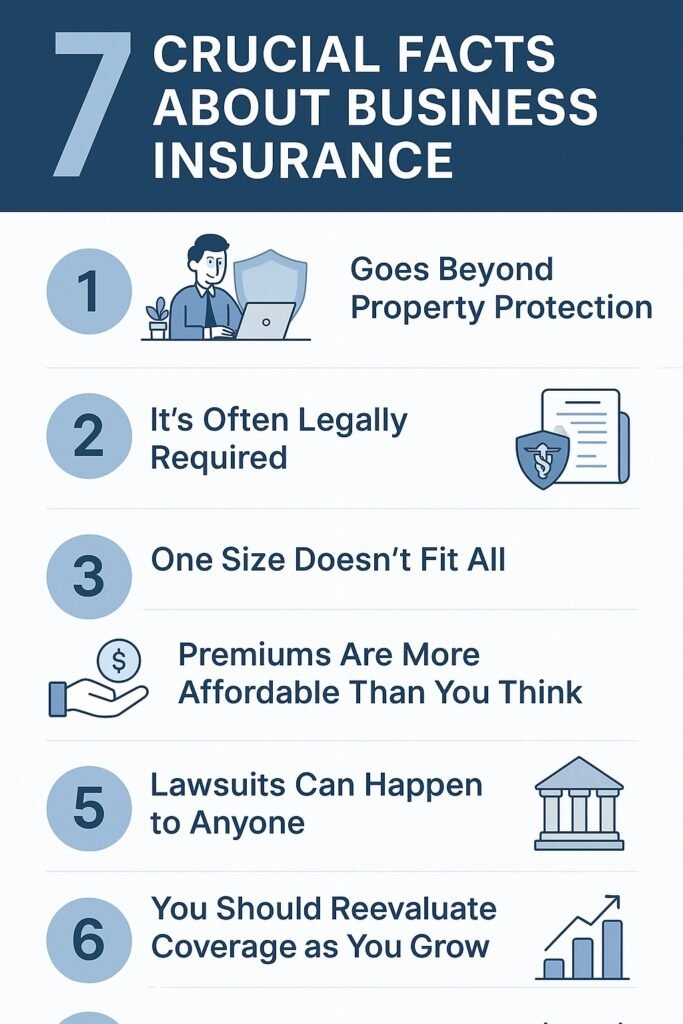Business insurance isn’t just a box to tick—it’s one of the most essential foundations of any successful company. Whether you’re running a solo consultancy or managing a growing startup with employees, business insurance protects your operations, finances, and reputation from unexpected setbacks. In this article, you’ll discover 7 crucial facts that every entrepreneur should know before choosing a policy—and why skipping coverage is one of the costliest mistakes you can make.

1. Business Insurance Goes Beyond Property Protection
Many people assume that business insurance is only relevant if you own a storefront or a warehouse. In reality, it’s much broader than that. Business insurance covers not only physical assets like buildings and inventory, but also legal liabilities, employee injuries, data breaches, and even temporary closures caused by disasters. It’s designed to shield your company from all the unpredictable risks that could otherwise put you out of business.
Imagine your office is damaged in a fire, or a client sues you over a service dispute—without insurance, the financial impact could be devastating. Business insurance fills that gap and ensures continuity, even in the face of disruption.
2. It’s Often Legally Required
Depending on where your company operates, you may be required by law to carry certain types of coverage. For example, most U.S. states mandate workers’ compensation insurance for any business that employs people. If you use vehicles for work, commercial auto insurance is also typically obligatory.
Even when not legally enforced, some types of insurance are contractually required. Landlords, clients, or lenders may insist that you have liability insurance before signing leases or deals. Operating without it can block business opportunities and expose you to legal penalties.
3. One Size Doesn’t Fit All
No two businesses are exactly the same, and neither should their insurance policies be. The right type of coverage depends heavily on the industry you’re in, the size of your company, your location, and your exposure to certain risks.
For example, a tech startup working with customer data will likely need cyber liability insurance, while a construction firm may prioritize general liability and equipment coverage. There’s no such thing as a universal “business insurance” plan—you need a combination that’s tailored to your specific situation. Insurance brokers or online comparison tools can help you identify and bundle the policies that matter most.
4. Premiums Are More Affordable Than You Think
One of the most common misconceptions about business insurance is that it’s prohibitively expensive. In truth, many small business owners can secure solid coverage for a few hundred dollars a year. A typical Business Owner’s Policy (or BOP), which combines general liability and property insurance, may cost between $500 and $1,200 annually for a small business.
Premiums vary based on factors like your industry risk, number of employees, past claims history, and the types of coverage you select. But considering the protection it provides, business insurance is often more of a bargain than a burden. Skimping on it to save a few dollars can cost you far more in the long run.
5. Lawsuits Can Happen to Anyone
You might think that only big corporations get sued, but small businesses are often just as vulnerable. A customer could slip on your floor, an employee might get injured, or a client might allege that your services caused financial harm. If you don’t have liability coverage, even a single legal claim could lead to tens of thousands of dollars in expenses—and potentially wipe out your business entirely.
Liability insurance is your legal safety net. It covers legal fees, settlements, and judgments, so you can focus on running your business instead of fighting for its survival in court.
6. You Should Reevaluate Coverage as You Grow
Buying a policy when you launch your business is a smart move, but it’s not a one-time decision. As your company expands, your insurance needs will evolve. Adding employees, opening new locations, offering new services, or buying expensive equipment should all trigger a reassessment of your insurance plan.
A policy that worked perfectly in year one may fall short by year three. Conducting an annual insurance review helps ensure that your coverage keeps pace with your business growth. Many insurers will even offer policy upgrades or add-ons that match your current situation without requiring a complete overhaul.
7. It Builds Credibility and Trust
Customers, investors, and partners are more likely to do business with a company that’s insured. Carrying business insurance signals professionalism, reliability, and preparedness. It shows that you take your responsibilities seriously and that you’re committed to operating in a trustworthy and sustainable way.
In fact, many contracts in B2B environments now include clauses that require proof of insurance. Failing to provide it could cost you key partnerships or clients. Simply put: business insurance doesn’t just protect you—it enhances your credibility in the eyes of others.
Final Thoughts
Business insurance might not be the most exciting topic in entrepreneurship, but it’s one of the most important. From protecting your physical assets to defending against lawsuits and boosting your professional image, the right policy can be the difference between survival and failure.
Take the time to understand your specific risks, research your legal obligations, and get advice from an experienced broker if needed. A solid business insurance plan is not an expense—it’s an investment in your company’s resilience, growth, and reputation.
Related Articles on BusinessAndWealthWithJames.com:
- Business Line of Credit – How flexible credit lines help manage cash flow.
Resources
Disclaimer: This article is for informational purposes only and does not constitute financial, legal, or tax advice. Please consult a professional advisor for personalized guidance.